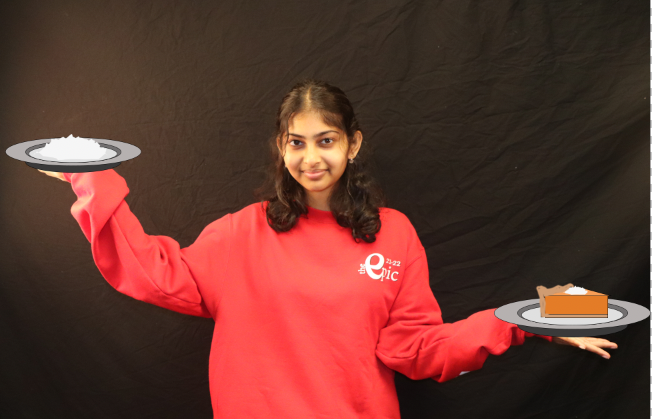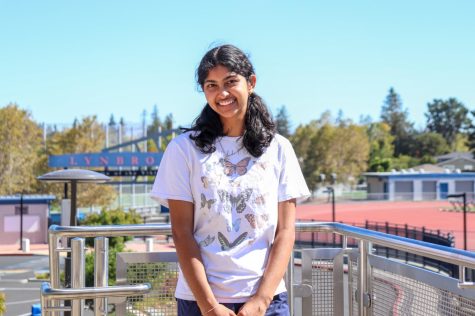Thanksgiving, but with yogurt rice?
While an American classic, pumpkin pie, has found its way to our table this time of the year, yogurt rice will always be a unique symbol of my parents’ immigration.
November 9, 2021
The streets of San Jose, Calif. were deserted on a stormy night in 1997 when Seetha and Sankara Sarma arrived at the lobby of Motel 6, drenched and holding a 5-year-old child in their arms.
My parents arrived in the U.S. on the night before Thanksgiving after a long journey from Bangalore, India. They had no prior knowledge of the holiday and were reasonably frightened when the streets were empty and every store was closed, leaving them unable to buy food or water. Although it was only 5:30 p.m., the annual El Niño rainstorms had darkened the sky with clouds, sending streams down my mother’s raincoat. Isolated and cold, my parents’ initial reaction was that they had made a mistake. This was not the sunny California they had signed up for.
After being reassured by my mother’s friend and colleague, who was kind enough to bring over food for the night, my parents decided to remain in the U.S. and find an apartment as soon as possible. That week, my father stayed in the motel to take care of my older sister while my mother went to work. My father often recounts with a crooked smile how horrible it was in that tiny room, eating only yogurt rice while trying to entertain my sister.
Growing up, I would watch my favorite characters on Disney Channel share a bountiful Thanksgiving feast and wonder why dozens of people never gathered at my family’s dinner table for huge portions of turkey and pie. But I soon realized that we would never be like the “normal” American family shown on TV: We were vegetarian, and they had turkey; our relatives were in India, so it was only the five of us; and ultimately, my parents did not care about a holiday that wasn’t culturally theirs.
But I still can’t help but think about that night in 1997. As people all over the country gathered with friends and family to feast, my family ate yogurt rice in a motel room.
When my sisters and I were growing up, we would make holiday crafts at school, hear about our peers’ plans to travel across the country and watch Thanksgiving specials on TV. It was inevitable that we would want to celebrate Thanksgiving, so our parents always allowed us to celebrate the holidays — also so they could escape our tantrums. I would spend hours curating the perfect Thanksgiving table: carefully baking pumpkin pies, finding replacements for turkey and instructing my family members on what to cook. They would laugh at me, but deep down, I was upset that my parents didn’t care as much as I did.
However, my Thanksgiving mania soon ended. Through lessons in school, I learned that the holiday contradicted my personal beliefs because it celebrates colonization, which has harmed native communities. The British’s exploitation of India, the country of my heritage, made me feel especially guilty for celebrating a holiday that applauds settlers claiming indigenous peoples’ land.
I also realized that it was kind of my parents to let us celebrate, at all, a holiday that had welcomed them with rain and nonexistent arms.
I had learned that some immigrants choose to celebrate Thanksgiving with the pride and gratefulness of successfully becoming American. Yet, I was still unsure whether Thanksgiving, with all its flaws, could ever be a holiday that represented the struggles and successes of the immigrant community. So when my father remarked that we came to America around Thanksgiving day while recounting our immigration story, I was relieved to end my conflict with the holiday. I hadn’t known until then that their arrival to the U.S. perfectly coincided with Thanksgiving.
Suddenly, I knew where I stood with Thanksgiving: I didn’t want to celebrate it — I wanted to celebrate my parents’ immigration. With the addition of pumpkin pie, of course, because at the end of the day, we’re still American.



































































